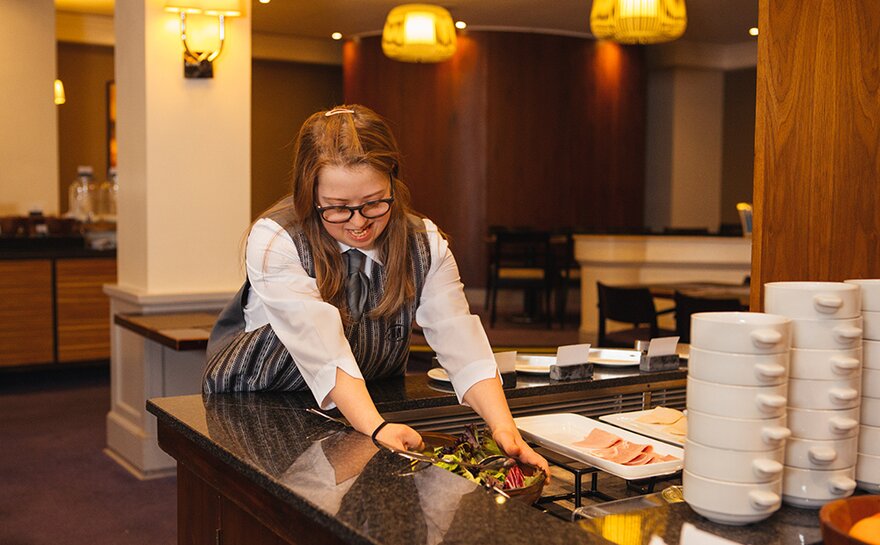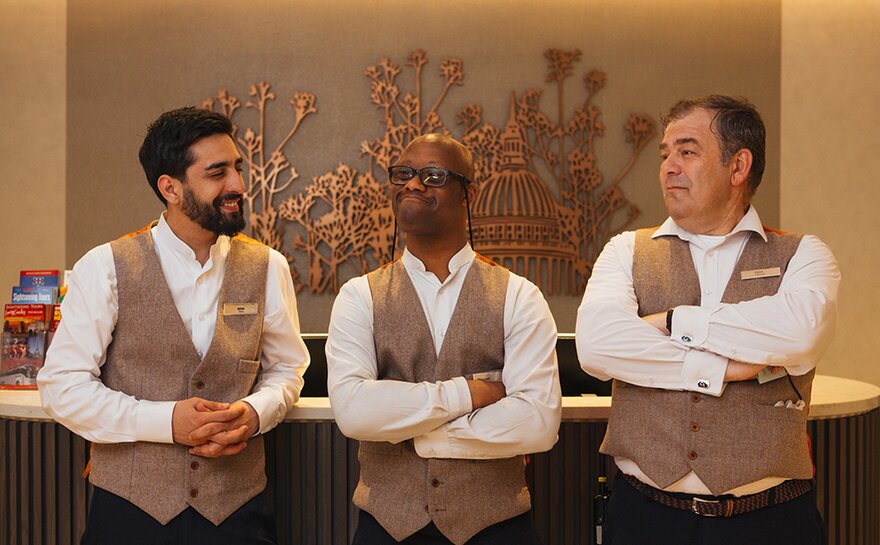Large companies such as Hilton making it part of their brand identity to welcome people with learning disabilities
A lmost nine in 10 people with a learning disability in the UK have experienced difficulties finding a job, according to a survey commissioned by Hilton earlier this year to mark Learning Disability Week.
However, of those that have hired someone with a learning disability, 89% said their new employee has met or exceeded their expectations. This strongly suggests that with the right support and infrastructure for employees and employers, staff with learning disabilities can contribute to a dynamic and enriched work environment.
Hilton has partnered with WorkFit, the employment arm of the Down's Syndrome Association, and Aurora Foxes, a training hotel in Minehead, Somerset, that specialises in educating people with learning disabilities, to diversify its hiring pool. The global hotel company has since hired almost 30 graduates into permanent roles across the UK, which range from revenue analysts to kitchen assistants.
Speaking at Hilton's Breaking Barriers: Supporting People with Learning Disabilities to Enter the Workplace Event, held at Hilton London Metropole, Steve Cassidy, senior vice-president and managing director of Hilton UK & Ireland, said: "Thanks to our partnerships with two fabulous organisations, we've been able to welcome some incredible people into our hotels over the past eight years. We have facilitated over 35 work placements and there are more to come." Be flexible
Esther Brittan, HR operations manager UK & Ireland at Hilton, advises businesses to start the hiring journey in partnership with organisations that specialise in training staff with learning disabilities.
"The key bit of advice I would give is to start small and to gain the confidence in the organisation so you can develop something that can be really scalable," she says. "Work with a partner until you've got a core of people in your organisation that can pass on that knowledge."
Chris Jackson, lead independent living skills tutor at Aurora Foxes, says employers should not always ask for a traditional CV: "At Foxes, we create a skills video which demonstrates what that young person is capable of doing. Allowing flexibility in interview formats depending on the individual in front of you can be really useful."
Mark Costello, principal at Aurora Foxes, encourages employers to look beyond immediate skills gaps. He says: "Think about if this person has the capacity to learn and the willingness to learn. You are being interviewed as well, so train your hiring managers to recognise and overcome bias."
Those interviewing applicants should also try to start with simpler questions and extend these based on skill level. Visual aids can be helpful too. It is important to make interviewees feel relaxed to get the best out of them.
Be prepared
Alison Thwaite, employment development manager at WorkFit, says operators should be prepared to give more context during the onboarding process. She explains: "Reasonable adjustments is a phrase that people get anxious about, but it can be something as simple as creating a timetable for somebody.
"We want to give employees as much information as they can. Where are the toilets? Is there a locker room? What kind of uniform is it? All of these things that most people think are not that important give somebody with learning disabilities a lot of context before they start the job.
She adds: "On day one of the job, the essentials are: ‘what happens if the fire alarm goes off?' and ‘what happens if you get injured'? Don't go through presentations for mandatory training. Just try and break it down, so maybe they do half an hour at a time."
Take time for integration
Like all employees, your new hire will want to be recognised as a member of the team. Thwaite says: "Make sure to build rapport and make people feel fully included. It's really about getting to know your colleague, their likes and dislikes, what motivates them and why are they coming to work."
Thwaite has found that most people with learning disabilities look for between eight and 16 hours of work a week. "A small number are looking at full-time or perhaps three- to four-hour shifts three to four times a week."
Brittan says the introduction of a buddy system can be particularly helpful, as it creates structure and familiarity: "The buddies are absolutely amazing. I think we use two to three buddies depending on the size of the hotel and the shift patterns. They will be trained by WorkFit so that they know how they can best support that individual. When we see the work coach from WorkFit slowly starting to step away, that's when we know that we're getting it right. That's not to say we don't call WorkFit back in again, when we need some additional support. Whether that be technical support or pastoral support, they are happy to intervene."
What's next?
What to do once your employee has been in the job for a few months? Hilton is keen to retain its "cohort of incredibly skilled, disciplined and determined young people", and one way to do that is to offer career progression.
"We are introducing an additional skills portfolio and we're trying to see whether we can offer supported apprenticeships so that we can offer a training and development programme for those individuals that would choose to do it. It's a work in progress but it's something we're very serious about. We've had conversations with our learning provider because how amazing would that be to continue the learning journey of those individuals."
Next steps
WorkFit
WorkFit is the Down's Syndrome Association's employment programme. The organisation works with both employers and job-seekers to find opportunities and train staff. They support a person from the WorkFit programme for as long as they are in the role.
Aurora Foxes
Aurora Foxes, a specialist college in Minehead, Somerset, is rated ‘Good' by Ofsted and offers students with learning disabilities the chance to pursue a career in hospitality and catering.
The residential curriculum encourages students to develop independent life skills while working towards qualifications that are recognised by employers.
Continue reading
You need to create an account to read this article. It's free and only requires a few basic details.
Already subscribed? Log In






